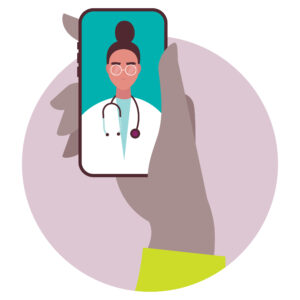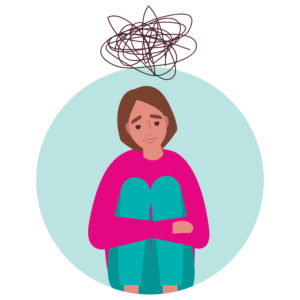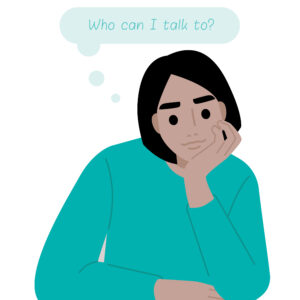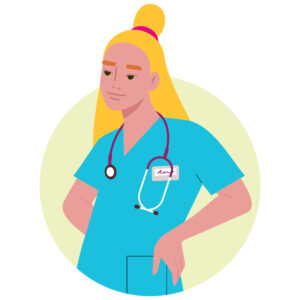Published July 2024.
“I don’t feel well. Who can help me? I need to talk to someone right now.”
Talk to a nurse. Call HealthLink BC at 8-1-1. Available any time day or night in 130 languages. Start by saying your language (e.g., “Punjabi” or “Mandarin”).
Call 2-1-1 or search bc.211.ca to learn about health and social support in your town. Available any time day or night in 240 languages and dialects.
Call a friend who speaks your language or reach out to a settlement worker.
Call the BC Mental Health Support Line at 310-6789 (just 7 numbers, no area code). They can give you emotional help. Interpreters are available.
“Something feels wrong in my body or thoughts, but it’s not an emergency.”
Make an appointment with your doctor (if you have one). It can take days or sometimes weeks to get an appointment. If you don’t have a doctor, call 8-1-1 or go to healthlinkbc.ca to get on the Health Connect Registry. The registry will put you on a waiting list for a doctor or nurse practitioner in your area.
*Canada has a shortage of healthcare workers. It can take months to find a doctor. Your appointment may be held online. It’s called a virtual appointment.
Go to a walk-in clinic. You may need to wait in line for many hours.
Visit an urgent and primary care centre, if your community has one. You may need to call ahead to see if they can take you in.
Find self-help resources at health care agencies, community centres or online. For children and adults, visit:
- heretohelp.bc.ca (for anyone)
- foundrybc.ca (for young people)
- keltymentalhealth.ca (for families with young people)
Talk to a pharmacist. They understand medical and emotional problems and can offer some treatments. But only a doctor, psychiatrist or nurse practitioner can prescribe medication for pain, anxiety, depression and other problems.
Call or email the Canadian Mental Health Association for free. Visit bc.cmha.ca.
“Something is VERY wrong. It feels like an emergency.”
Call a crisis line for emotional help, such as 310-6789 (just 7 numbers, no area code).
Young people ages 5 to 29 can call Kids Help Phone: 1-800-668-6868 (toll-free) or text CONNECT to 686868, any time day or night.
Contact a suicide hotline any time of day or night if you are having thoughts about hurting yourself. 1-800-784-2433 (1 800 SUICIDE) or crisiscentre.bc.ca OR 9-8-8 suicide crisis helpline. Everything you say is confidential (kept private).
Go to a hospital. You may get to see a doctor right away. Or you may have to wait in line for many hours. It depends on your problem and the number of people there before you.
Connect with victim services any time of day or night if you are experiencing family or sexual violence. This includes emotional abuse. Contact 1-800-563-0808 or victimlink.bc.ca. Interpreters are available.
“I need an ambulance or help from police.”
Call 9-1-1 any time day or day. Explain the problem and its effect on you or your family. Interpreters are available in 173 languages.
Examples of emergencies:
- I can’t breathe
- I have chest pain
- I want to hurt myself or someone else
- Someone is hurting or scaring me
How to access health services
Health services are free if you and each family member has a BC Services Card.
BC Medical Services Plan: gov.bc.ca/MSP
To get a card, you must first live in Canada legally for 6 months. It can take up to 3 months to get a card. Before then, you need private insurance or money to pay for health care.
Step 1: Register for the Medical Services Plan (MSP). You get access to family doctors, medical tests and treatments. It does not include dental or eye care.
Then, wait for a letter in the mail.
Step 2: Go to an ICBC driver licensing office with your MSP letter and 2 pieces of identification. They will take your photo for your card. People under 18 or over 75 do not need to go to the office to get a photo taken.
Then, wait for your BC Services Card in the mail.
If you are a refugee, you can register for the Interim Federal Health Program and receive services for one year. Type “Canada refugee health” in an Internet search box for more information.
If you have a low-income family, you can sign up for:
- Supplementary Benefits: pays part of some medical services such as acupuncture and massage therapy.
- Healthy Kids Program: pays for basic dental, eye and hearing care.
- Fair Pharmacare: pays for prescription medications and medical devices.
Taking care of your mind
Taking care of our mind is as important as our body. Our thoughts and feelings are part of our health. Sometimes we need help managing our thoughts, feelings, or behaviours. In Canada it is common for adults and children to ask for clinical and emotional help from doctors, counsellors and support groups. It is also common to seek self-help resources.
Types of people who can help
Nurse – a person trained to help doctors help patients by listening and tending to their problems.
Settlement worker – a person who knows your language and culture. They can explain how to live and find things in Canada.
Counsellor – a person who listens to your problems and helps you find ways to solve or cope with them.
Doctor (sometimes called a General Practitioner or GP for short) – a person who helps you take care of your body and mind. They help with physical and emotional problems. They can prescribe medicine. They can also refer you to a specialist:
Specialists are doctors who focus on special problems or body parts (e.g., hearing, heart disease, diabetes, cancer, pregnancy, young children or older adults, etc.).
Psychiatrist – a kind of specialist doctor who specializes in emotional and mental health. Psychiatrists do not usually provide counselling. They mostly help with finding out what the problem is (called diagnosing), with prescribing medicine or helping someone who needs help in hospital.
“Who can I talk to?”
Healthcare worker – anyone who has a job in the healthcare field (nurse, doctor, etc.).
Pharmacist – a person who fills a medicine prescription from your doctor. They can tell you how to use the medicine properly. They will also answer many health questions.

Nurse practitioner – a nurse with special education. They can find out what is wrong, order tests, and write prescriptions.
Interpreter – a person who can help you communicate with someone like a doctor. The Provincial Language Service provides free interpretation services in over 150 languages. Not all doctors know about this service so you may have to tell them and ask them to sign up.
Download this booklet as a PDF
- Arabic PDF | Arabic Audio Recording
- Chinese Simplified PDF | Mandarin Audio Recording
- Chinese Traditional PDF | Cantonese Audio Recording
- English PDF
- Hindi PDF | Hindi Audio Recording
- Pashtu PDF | Pashto Audio Recording
- Persian PDF | Persian Audio Recording
- Punjabi PDF | Punjabi Audio Recording
- Spanish PDF | Spanish Audio Recording
- Ukrainian PDF | Ukrainian Audio Recording
These materials were made possible thanks to a grant from the Province of BC.


